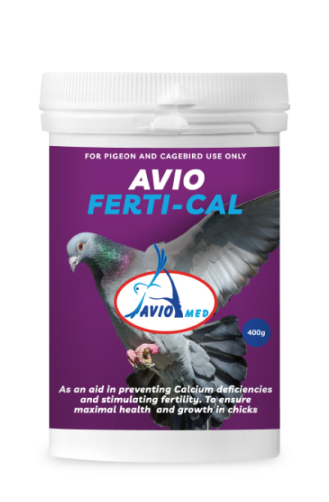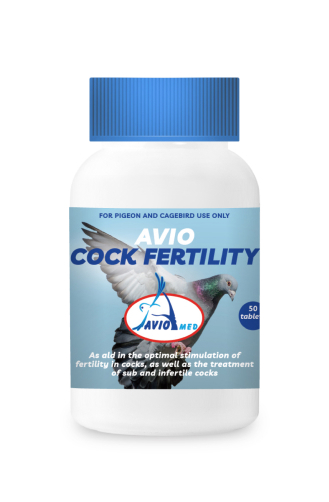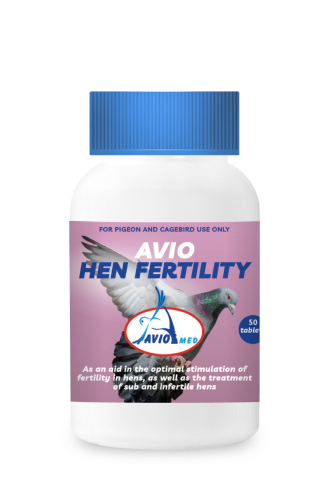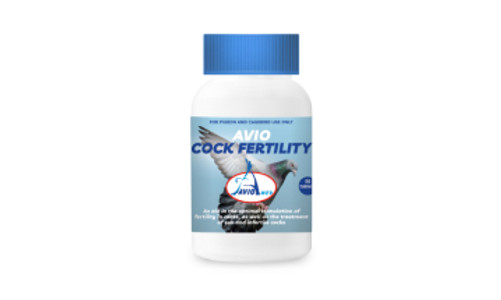Posted by Ockert Botha (BVSc) on Mar 24th 2023
Maximizing Fertility And Breeding Performance In Fancy Pigeons
Introduction
The success of a racing pigeon fancier’s next season is hugely dependant on the raising of perfectly healthy babies. In the previous article regarding the breeding of healthy babies I discussed the importance of breeding from healthy stock and raising healthy babies to ensure the next successful season. However it is just as important to ensure that the breeding performance is optimised so that each pair produces the optimal amount of babies per season.
Determining the Squeaker percentage
In the final analysis the breeding performance is evaluated on the amount of healthy and vibrant babies that was raised per pair of pigeons in the breeding loft. Farmers raising stock will refer to their success in breeding as lamb or calf percentage. This is calculated by determining the amount of Ewes or Cows the farmer breeds with and dividing that by the total amount of Lambs or calves bred for that season and then multiplying that figure by 100 to reach a percentage score.
Pigeon fanciers should do the same calculation by determining the amount of hens that was used to breed from and dividing that number by the total amount of babies bred for the season and then multiplying that number by 100. We may refer to this number as the Squeaker percentage. Each fancier should benchmark his breeding operations Squeaker percentage against himself as many factors may play a role in this.
Factors determining the fertility of pigeons
The general health of the pigeons:
Information on this subject was covered in detail in my previous article (Scientifically based Pigeon Health Programs will optimize your breeding season). Please refer to this article as the health of the breeding stock and babies bred is the basis of breeding success.
Season – Daylight length:
As we all know many animals and especially birds have a specific breeding season when nature determines that now is the optimal time for breeding. Although pigeons may breed through the year it is far better to limit their breeding to the natural optimal breeding season. This will follow a complete or near complete moult and will start in spring. The determining factor for these seasons is the daylight length. Once the daylight length increases the complex hormonal system that is regulated primarily by the Thyroid gland is activated and breeding will start. It is hugely important to take this into account when artificial lights are used in the breeding loft.
Genetics:
Many breeds especially those in the fancy pigeons will have an anatomical conformity that makes it difficult to mate successfully. It is also well known that some strains of pigeons have a lower libido or suffer from early onset infertility. Fanciers should take this into account and take special care to maximise these pigeon’s breeding performance.
Mycotoxins:
The growth of certain moulds on grain will produce Mycotoxins that cannot be detected without very specialized tests. One of these Mycotoxins is called Zearalnanone and is well known to cause infertility in poultry, farm animals, pigs and even dogs. A supplement that contains Toxin binding clays that will prevent the absorption of these Mycotoxins should be given twice a week. The Mycotoxins are cumulative toxins and if absorption can be prevented twice per week it prevents many of the negative effects that these have on the immunity and fertility.
Chemical compounds and medicines:
Many insecticides and heavy metal containing products are known to cause infertility. As with the mycotoxins these are normally cumulative in nature and if absorption can be prevented by adding the pigeon specific Toxin binding clay product the negative effects of the above may be minimised. Fanciers should also be cognisant of the negative effect that certain Antibiotics for example the Quinolone type antibiotics may have on pigeons. When pigeons are treated against Paratyphoid for the 10 day course of 4 x the dosage with a well-known poultry antibiotic a much higher incidence in early Cock infertility is noticed.
Age and Nutrition:
The optimal physiological fertile age declines in pigeons at around 8- 10 years with many pigeons however able to breed until much older than this. Ideally the pigeon fancier should limit the amount of babies bred in pigeons older than 10 years to two rounds per season. When infertility is caused primarily by age related physiology the use of fertility enhancing supplements containing specific Vitamins and Nutraceuticals such as Vitamin E, Co enzyme Q10 and certain plant extracts may be successful in restoring fertility to pigeons. Current scientific research done specifically on pigeons has proven conclusively that one of the Nutraceutical compounds known as Q enzyme Q 10 will stimulate fertility in pigeon cocks by stimulating sperm production and health. Taking this research into account a well formulated fertility supplement should also contain Q10 and should be added to the food as Q10 is not water soluble. It is always best to combine a well-researched Fertility enhancing as well as Calcium containing pigeon specific product as a general supplement during the breeding season. The latest research has however concluded that pigeons need more than one form of Calcium salt and also the more refined salts to ensure optimal absorption of Calcium into the blood stream. When acquiring a Calcium supplement it is important to verify whether these higher quality Calcium salts are in fact included in the formulation. The AvioFertical product ticks all of the above boxes.
Fertical
Available Size:
400g
Advantages:
Fertical is the most complete and well researched supplement ever developed for supplementing during the breeding season. It is the first supplement to support fertility, egg production and optimal growth and health of babies. In keeping with the latest avian research regarding Calcium metabolism it contains three of the most bio-active Calcium salts with all the co-factors needed to ensure optimal Calcium absorption. This ensures the most perfect egg shell quality and growth of babies. The unique addition of Co-Enzyme Q10, selected herbs, high levels of Vitamin E and Beta Carotene stimulates fertility in older cocks and hens ensuring that even older stock birds will breed and raise vigorous and health babies. The inclusion of the highest quality Colostrum and Whey powder imported for New Zealand ensures optimal immunity of youngsters. A first ever, truly unique, three in one breeding supplement!
Specific natural fertility enhancing tablets made for Cocks and Hens should be dosed to valuable pigeons that are sub-fertile or infertile. It is important to be sure that these Fertility enhancing tablets are well researched contain far more than just Vitamin E as some of the earlier Cock or Hen fertility tablets do. AvioCockfertility and AvioHenfertility have been formulated to achieve the above.


Available Size:
50 Tabs
Advantages: By combining well researched and proven fertility enhancing elements specifically found in nature and specifically formulating different tablets for the use in Cocks and Hens Aviomed has developed two unique tablets as an aid in maximising breeding performance in Cocks and Hens. The use of Cock and Hen fertility tablets has been scientifically proven to stimulate infertile Cocks and Hens to breed again. Fertility vitamins and minerals as well as researched Nutraceuticals and plants extracts have been included to assure that the newest research in taken into account in the formulation of these highly effective tablets.
Hormone injections:
As a last resort the above mentioned Cock and Hen specific tablets may be combined with a course of specific Cock and Hen Fertility enhancing Hormone preparations. These hormone injections are used in cases were the tablets have not been successful in stimulating fertility. Based on many years of scientific research the author has developed two very specific hormone injections for Cocks and for Hens. For further details regarding optimal breeding programs or to acquire the above mentioned Cock and Hen fertility tablets or hormone injections in the USA fanciers may E mail an enquiry to info@foyspetsupplies.com
Conclusion
Pigeon fanciers should not accept a low Squeaker percentage as normal when breeding pigeons. If pigeons don’t breed well the fancier should try to ascertain the reason for this and rectify it. Following a well-researched pigeon Pre Breeding, Breeding and Youngster program will ensure a high Squeaker percentage and the raising of vibrant and healthy babies.

